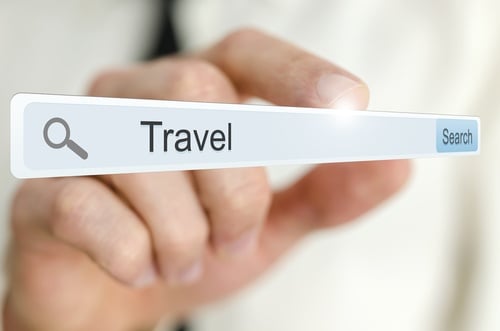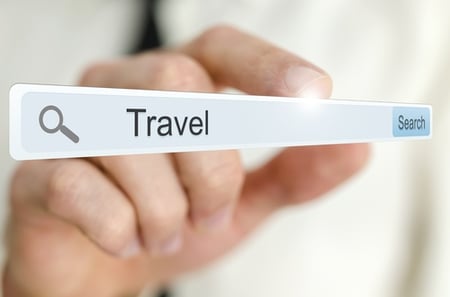Working Smart: How Travel Agents Benefit from Advanced Booking Systems
By Nick Ostdick on Jul 19, 2016 9:39:35 AM

I was recently flying to Washington, D.C. for a regional travel conference and, to pass the time, tried to  download a new online banking app on my smartphone. It was a very frustrating experience because the download would on the surface appear complete, but the app would not open or would quickly crash only moments after I logged in. I finally read the terms and conditions of the app to discover my phone - or more precisely, my phone’s operating system - was not compatible with the app, hence the failure to download properly.
download a new online banking app on my smartphone. It was a very frustrating experience because the download would on the surface appear complete, but the app would not open or would quickly crash only moments after I logged in. I finally read the terms and conditions of the app to discover my phone - or more precisely, my phone’s operating system - was not compatible with the app, hence the failure to download properly.
In short, my phone lacked the necessary tools to successfully work with this advanced, updated app. And perhaps it was because I was en route to a travel conference, but this experience got me thinking about travel agents and how today’s advanced, integrated booking systems may be one of the most crucial aspects to the success and growth of travel agencies in today’s modern travel industry.
Deploying the right tools - the most efficient, sophisticated booking systems available - in helping customers research and book tourism and travel is more important today than ever before with the rise online travel agencies, travel review websites, and even social media, especially in terms of increasing conversion, customer retention, and customer engagement. Whether it’s utilizing the internet for geolocation purposes or reservation systems with greater computing power and quicker return times, here are several ways in which advanced booking systems are key value propositions for travel agents to leverage in remaining a viable, valuable part of the travel industry.
Decreased Search Times
Perhaps one of the most important value propositions of advanced booking and reservations systems is a significant reduction in the amount of time it takes these systems to return searches - and not just basic searches, but smart or intelligent searches with advanced criteria based on a customer’s prior travel experiences or current wants and desires. In an era when so many travelers can research and complete bookings with the technology they carry in their pocket on a daily basis, the onus is on travel agents to deploy booking systems with enough computing power to return advanced searches in a competitive enough manner. Plus, advanced booking systems also help decrease the amount of time travel agents must devote to searching for potential bookings and increase the level of focus they can give customers, which is vital for customer engagement and retention.
Mapping
Because so many of today’s travelers are focused on experiential travel - travel, tours, and activities that highlight the cultural experience of a place through unique experiences - the ability to search bookings and reservations via a mapping function is critical in providing customers with the personalized trip they so seek. For example, let’s say a customer wants to book a hotel in Paris near public transportation, but also within walking distance to some of the city’s most famous bakeries and pastry shops. Mapping technology, which is integrated with online capabilities, allows travel agents to source bookings on a street-by-street basis in order to best serve the customer’s wishes. The capability to search for hotels by neighborhood, landmark, or points of interest also provides travel agents with the flexibility to serve as something of a local guide for travelers who are unfamiliar with their destination.
Optimize Bookings
Whether referred to as an optimized booking or an add-on, advanced booking systems allow travel agents to easily and quickly suggest and position other offers to customers aside from merely a hotel reservation. Imagine our visitor to Paris books a hotel within just a few blocks of a lauded local bakery that gives daily tours of its operation. With an advanced booking systems, travel agents will be alerted to such an activity based on the criteria for the customer’s hotel search, which they can then position to the customer as a valuable add-on to their existing booking. This not only provides customers with peace of mind that their travel agent is invested and engaged with their upcoming travel experience, but it also allows agents to create more dynamic packages which in turn can increase conversion and customer retention, turning a one-time customer into a repeat customer.
Easy Alterations
The travel industry is prone to changes and cancellations. Hotel accommodations need to be altered due to last minute fluctuations in the number of guests to be housed. Because the likelihood of these events is so high, travel agents must deploy booking systems with enough maneuverability to combat potential disruptions in a customer’s reservation. Advanced bookings systems allow travel agents to quickly and efficiently manage modifications and alterations in real-time even when travelers are on the ground at their destination. No longer should travel agents be bound to 9-5 operational functionality with their booking systems. Instead, leveraging an advanced system allows travel agents access to bookings and reservations 24/7 to offer travelers the most reliable customer service platform.
- travel technology (60)
- Travel Industry (49)
- travel agency (31)
- travel erp (31)
- travel trends (28)
- travel booking system (23)
- TINA (21)
- travel company (19)
- Tour Operator (18)
- Product updates (17)
- Travel Management Company (17)
- AIDA (15)
- TBS (15)
- Business Travel (14)
- dcs plus news (14)
- tour operator solution (14)
- travel website (14)
- travel erp system (13)
- Mobile App (12)
- Travel App (12)
- mid back office solution (12)
- trends (12)
- Corporate Travel (11)
- Industry Events (11)
- Mobile Technology (11)
- TMC (11)
- travel agents (11)
- erp (10)
- erp system (10)
- Tour Operators (9)
- Travel booking engines (9)
- dcs plus (9)
- online travel agency (9)
- travel agent (9)
- Mobile Bookings (8)
- travel (8)
- travel agencies (8)
- 2017 (7)
- Business Traveler (7)
- Mobile Travel (7)
- travel business (7)
- travel software (7)
- Digital Technology (6)
- Insider (6)
- Millennials (6)
- Online booking systems (6)
- Travel Management Companies (6)
- process automation (6)
- travel companies (6)
- Big Data (5)
- Partners interviews (5)
- Tour Operator Software (5)
- customer retention (5)
- travel agency technology (5)
- Booking engines (4)
- CSBT (4)
- Mobile Device (4)
- Mobile travel apps (4)
- OTAs (4)
- Static databases (4)
- Tour Companies (4)
- Travel Policy (4)
- Travel booking systems (4)
- Travel suppliers (4)
- back office automation (4)
- corporate self booking tool (4)
- millennial travelers (4)
- online travel (4)
- responsive travel website (4)
- technology (4)
- travel website conversion (4)
- 2016 (3)
- Content mapping (3)
- Databases (3)
- Demographics (3)
- Food and Adventure Tourism (3)
- Mobile Apps (3)
- Travel Distribution Channels (3)
- Travel Management Software (3)
- Travel customers (3)
- Travel history (3)
- anniversary (3)
- automated processes (3)
- content matching (3)
- global travel industry (3)
- social media (3)
- travel agency workflow (3)
- travel back office (3)
- travel marketing (3)
- travel process automation (3)
- AI in travel (2)
- Advanced Booking Systems (2)
- B2B Travel Resellers (2)
- Bleisure (2)
- Branding (2)
- Business Process Automation (2)
- Business Travelers (2)
- Customer engagement (2)
- Financial Reporting (2)
- Food Tourism (2)
- Inbound Marketing (2)
- Infographic (2)
- Leisure Travel (2)
- Saas (2)
- Templates (2)
- Travel Costs (2)
- Travel bookings (2)
- Travel start-up (2)
- Travel website abandonment (2)
- WTM 2016 (2)
- abandoned travel bookings (2)
- engagement marketing (2)
- internet booking engine (2)
- millennial traveler (2)
- new travel company (2)
- office (2)
- online reputation management (2)
- online travel reviews (2)
- reporting (2)
- software (2)
- start-up tips (2)
- travel agency management (2)
- travel agency website (2)
- travel experience (2)
- travel mobile app (2)
- travel packages (2)
- travel reservation system (2)
- travel system (2)
- travelers (2)
- web-based travel erp (2)
- 2020 (1)
- 360 Customer View (1)
- Advanced Accommodation Contract Management (1)
- Adventure travelers (1)
- Apps (1)
- B2B Reseller (1)
- B2B Resellers (1)
- B2C (1)
- BI Reporting (1)
- Budget traveler (1)
- Cancellations (1)
- Chat (1)
- Chinese millennial (1)
- Cloud (1)
- Cognitive computing (1)
- Comparison shopping (1)
- Conference (1)
- Contact matching (1)
- Content (1)
- Cruise (1)
- Culinary traveler (1)
- Customer relations (1)
- Digital Innovation (1)
- Digital Natives (1)
- Documents (1)
- Emerging market travelers (1)
- Emerging markets (1)
- Errors (1)
- Experimental travel (1)
- Financial Dashboard (1)
- Import rates (1)
- Instant messaging (1)
- Integrate with Accounting Software (1)
- Internet (1)
- Luxury traveler (1)
- Mobile Transaction (1)
- Mobile payments (1)
- NDC distribution (1)
- Operational Reporting (1)
- Reseller networks (1)
- Resellers (1)
- Response (1)
- Subagents Network (1)
- TINA Academy (1)
- TTE (1)
- Travel Reseller Network (1)
- Travel Revenue Management (1)
- Travel booking problems (1)
- Travel finance reporting (1)
- Travel stats (1)
- WTM (1)
- abandonment (1)
- accomodations (1)
- advanced reporting (1)
- airline direct connect technology (1)
- ancillary services (1)
- cloud computing (1)
- collection (1)
- collection challenges (1)
- common data model (1)
- conversion rates (1)
- corporate mobile app (1)
- cost control (1)
- credo ventures capital invests in dcs plus (1)
- customer reviews (1)
- data analysis (1)
- dcs plus credo investment (1)
- dcs plus credo ventures (1)
- deloitte technology fast 500 EMEA (1)
- digital transformation (1)
- e-invoicing KSA (1)
- email marketing (1)
- email marketing for OTAs (1)
- erp e-invoicing (1)
- lost travel bookings (1)
- modern travel agencies (1)
- networks (1)
- new features (1)
- offers (1)
- online customer review (1)
- online reputation (1)
- online travel agencies (1)
- risk management (1)
- sales (1)
- senior travelers (1)
- shopping baskets (1)
- shopping carts (1)
- social network (1)
- standardized processes (1)
- static content (1)
- travel SaaS (1)
- travel account services (1)
- travel agency customers (1)
- travel agency profitability (1)
- travel analytics (1)
- travel blog (1)
- travel planning (1)
- travel reviews (1)
- travel shopping carts (1)
- travel software for agencies (1)
- travel software system (1)
- travel technology europe (1)
- travlist smart mobile app (1)
- trend (1)
- trusted adviser (1)
- trusted advisor (1)
- upsell functionality (1)
- vouchers (1)
- website traffic (1)
- zatca (1)
Subscribe by email
You May Also Like
These Related Stories

3 Reasons Why Travel Agents Should Optimize Search Capability

How Agents Can Benefit From A Travel Booking System


No Comments Yet
Let us know what you think